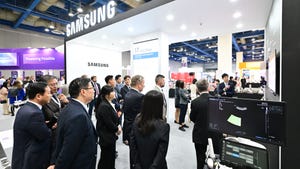Cisco Looking for Control?
Will it or won't it acquire a session controller startup this year?
July 31, 2003

What's the betting that Cisco Systems Inc. (Nasdaq: CSCO) will acquire a startup making session controllers within the next year?
The rationale for this happening goes like this:
1. Session controllers are hot.
They promise to play a critical role in the delivery of services based on the Internet Engineering Task Force (IETF)'s Session Initiation Protocol (SIP). And SIP-based services are already taking off at an incredible rate:
Vonage Holdings Corp., which has pioneered SIP-based voice-over-IP (VOIP) services in the U.S., has been reporting massive increases in call volumes this year -- see Vonage Boasts Big Call Volumes and Vonage Reports Soaring VOIP Volumes).
Digisip AB, a Swedish provider of SIP-based services expects a 10- to 30-fold increase in traffic in the next three years, according to its CEO, Hans Eriksson.
For specifics on the role that session controllers play in this potential revolution, tune in to today's Light Reading Webinar, entitled "Session Controllers: Why They're Key to VOIP," which is being staged at 2:00 PM New York time. To register, just Click Here.
In a current Boardwatch Poll on the topic, 40 percent of respondents say session controllers are "critical" to the development of VOIP, and a further 40 percent say they're "important." Only 20 percent say the VOIP market could survive without session controllers.
2. Cisco needs to catch up.
Alcatel SA (NYSE: ALA; Paris: CGEP:PA) has already acquired a session controller startup -- Avarox (see Alcatel Buys Some VOIP Security).
It's also becoming painfully obvious that Cisco needs a session controller in its own product portfolio (see NexTone Solves Cisco VOIP Shortcoming).
3. Session controller startups are two a penny.
They include:
This adds up to a lot of players fighting over a very small market at present. Gossip has it that some session controller startups have yet to land a customer.
In the aforementioned Boardwatch Poll, 56 percent of respondents say the session controller market isn't big enough to support more than three to five startups. Twenty-four percent say six or seven could survive. There are 11 in the list above.
On market size, 44 percent say the market will be worth between $10 million and $100 million by 2005, while 36 percent say it will be between $100 million and $500 million.
The rationale for Cisco not acquiring a session controller startup goes like this:
1. The jury's still out on whether providers of SIP-based services will deploy such equipment.
Digisip's Eriksson says he won't. "We don't have a network," he points out, so he has nowhere to install session controllers.
Besides, even if Digisip could install the equipment, Eriksson says he wouldn't. He thinks the most popular function of session controllers -- SIP-enabled firewalls -- should be deployed by enterprises. This view is shared by Olle Westerberg, CEO of session controller startup Ingate Systems.
Eriksson also says that Digisip isn't interested in offering its customers quality of service (QOS) assurances, another function of session controllers. "If customers have a lousy ISP, that's their problem," he says.
2. Session controllers could be just a marketing miasma
(Dictionary definition of miasma: "An unwholesome exhalation," from the Greek word for "pollution.")
The term was invented by the Yankee Group, possibly at the behest of a vendor wanting to create a new product category for its developments (see Yankee Makes Up a New Category).
In fact, startups in this field argue a lot about terminology, because their boxes combine different functions and sit in different places in the network -- in some cases within enterprise sites, in other cases at the edge of the network, and in yet other cases in the core.
All of this suggests that the different functions of session controllers could be integrated into existing bits of kit, such as firewalls and edge routers. In the long run, the whole concept of session controllers might just disappear in a puff of (unwholesome) smoke.
In the oft-mentioned Boardwatch Poll, 25 percent of respondents say session controller technology will by subsumed into general-purpose routers. A further 42 percent say it's possible, and only 29 percent think that session controllers are here to stay.
3. Cisco's position on SIP isn't simple.
Although Cisco has SIP-standard-compliant products, it also has its own proprietary Skinny Client Control Protocol (see Cisco Gets Fat on Proprietary VOIP). [Ed. note: IGRP vs. OSPF all over again?] Whether this would influence Cisco's stance on session controllers is difficult to figure out.
So there you have it, both sides of the issue. What's the verdict?
— Peter Heywood, Founding Editor, Light Reading
You May Also Like










